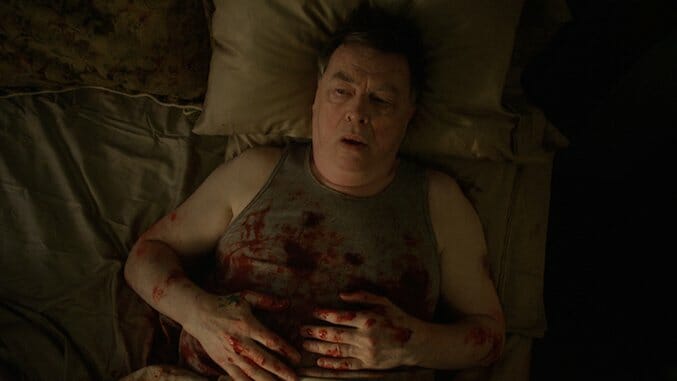Dementia

On paper, Dementia, a new thriller-horror directed by Mike Testin, reads like another take on the evil nurse archetype, epitomized so terrifyingly by Kathy Bates’ Annie Wilkes in Misery. The comparison turns out to be unfair—to Misery, that is. Dementia is an innocuous film that’s largely devoid of true suspense or chills. While a few cheap scenes of blood and gore are sprinkled throughout for good measure, and a nice twist-in-a-twist toward the end piques audience interest, it proves too little, too late.
George (Gene Jones), a Vietnam veteran, is the grumpy old man of his sunny Southern California neighborhood. He’s so cantankerous, in fact, that he shoots a gun in the air to stop kids from bullying another boy. Though his mental faculties are already questionable, George has a stroke on his front lawn and wakes in a hospital room with his estranged son Jerry (Peter Cilella) and granddaughter Shelby (Hassie Harrison) at his bedside. The father-son relationship is icy at best, but Shelby seems eager to connect with George, whom she hasn’t seen since she was a little girl.
There’s a period of detente while Shelby and Jerry take care of George at home, but they need to talk about options for care. It’s a difficult discussion, compounded by George’s confusion and flashbacks to his time in Vietnam. Jerry’s eager to find an assisted living facility, but George wants to remain at home. Just when they’re at an impasse, the bell rings and it’s Michelle (Kristina Klebe), a nurse with a sweet disposition sent by the hospital to check up on George. This plot point in Meredith Berg’s script is probably the most difficult to swallow—when does a nurse appear unannounced on your doorstep? What magical health care system is this?
Shelby, played captivatingly by Harrison, asks if Michelle would be interested in working as a live-in nurse for her grandfather, and unwittingly sets the nefarious Florence Nightingale’s wheels in motion. As soon as Shelby and Jerry leave for their hotel, Michelle wastes no time with a big syringe, injecting George with something the doctor didn’t order. Just like that, George becomes a victim of elder abuse and a prisoner in his own home; there’s absolutely no buildup of suspense. The film then falls into a familiar pattern of taunting, torture and blaming the victim. George is more coherent and aware than most people think, but Michelle convinces everyone that his dementia has severely impaired his faculties.
-

-

-

-

-

-

-

-

-

-

-

-

-

-

-

-

-

-

-

-

-

-

-

-

-

-

-

-

-

-

-

-

-

-

-

-

-

-

-

-








































